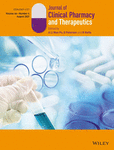Anaplastic lymphoma kinase tyrosine kinase inhibitor-induced hepatic failure in lung cancer patients: A study of signal mining and analysis of the FDA adverse event reporting system database
Ziye Zhou and Chenxiang Wang contributed equally.
Funding information
This work was supported by the Zhejiang Provincial Natural Science Foundation of China [grant number LYY19H310007], and Medical Health Science and Technology Project of Zhejiang Provincial Health Commission [grant number 2018KY519], and Basic Scientific Research Project of Wenzhou [grant number Y20190653].
Abstract
What is known and Objective.
Anaplastic Lymphoma Kinase Tyrosine Kinase Inhibitors (ALK TKIs) are standard first-line therapy for non-small cell lung cancer patients with ALK rearrangement. Although some cases of hepatotoxicity related to these drugs have been reported, there is still a lack of investigation on severe hepatotoxicity, such as hepatic failure, with ALK TKIs.
Methods
We evaluated ALK TKI (crizotinib, alectinib, brigatinib, ceritinib and lorlatinib)-induced hepatic failure events (AIHFEs), by using the Reporting Odds Ratio (ROR) and Bayesian Confidence Propagation Neural Network method for mining the adverse event report signals in the FDA Adverse Event Reporting System (FAERS) database from Jan 2013 to Dec 2019.
Results and Discussion
The AIHFEs of “Hepatic failure,” “hepatitis fulminant” and “hepatic necrosis” were defined as exposure event signals caused by ALK TKIs. The RORs of “Hepatic failure” were 4.95 (2.36–10.42) in alectinib, 3.77 (1.69–8.40) in ceritinib and 2.45 (1.60–3.76) in crizotinib, respectively. The ROR of “hepatitis fulminant” was 7.86 (3.52–17.54) in crizotinib. The Information Component value of “hepatic necrosis” was 1.97 (0.15) in alectinib. In reports of exposure-event signals, the clinical outcome of eventual death was common and could occur within 3 months. In the reports of “hepatic failure,” there was no significant difference in the number of reports between men and women [OR=1.86 (0.94–3.67), p = 0.09].
What is new and Conclusions.
By mining the adverse event report signals in the FAERS database, we found the exposure event signals of AIHFEs in ALK TKIs were “hepatic failure,” “hepatitis fulminant” and “hepatic necrosis”. AIHFEs were more likely to appear in the reports of ceritinib, crizotinib and alectinib.
CONFLICTS OF INTEREST
The authors declare that they have no conflict of interest.




